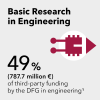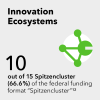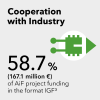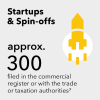Ground-breaking, creative Research in STEM
TU9 Universities enjoy an outstanding reputation around the world as renowned research and teaching institutions. Leading positions in obtaining third-party funding, top-class publications and successes in the Excellence Strategy are proof of that.
From basic to applied research, TU9 scientists work in interdisciplinary teams and international projects. The combination of internationally competitive, cutting-edge research with innovative application is reflected in a wide range of collaborations with industry and creates ideal conditions for innovation and the successful transfer of business ideas to start-ups and companies.
TU9 Universities assume social responsibility and aspire to contribute to the resolution of global challenges as local, national and international players.



Sources: (10) Applicant and/or participant; Excellence Clusters Bewilligung, DFG 2018; (1) Third-party funding in the focus area engineering by the German Research Foundation (DFG) (2017 – 2019) | DFG Förderatlas 2021; (12) "Spitzencluster” with TU9 participation; federal funding format; part of the Hightech-Strategy of the Federal Government https://www.clusterplattform.de/CLUSTER/ Redaktion/EN/Textbaustein/spitzencluster-wettbewerb.html (08/2022)
Innovation & Transfer
TU9 Universities assume responsibility for the present and are committed to the future of our society and thus to the UN’s 17 Sustainable Development Goals (SDGs). Their unique strength lies in their broad portfolio of subjects, enabling them to combine their expertise in engineering and natural sciences with the humanities and social sciences in interdisciplinary consortia to develop solutions to the major challenges of our times.
As drivers of innovative technologies, through the development of digital solutions and systematic transfer to application, TU9 Universities are a core element of the German innovation powerhouse. The large number of cooperations with global corporations on the one hand and small and medium-sized enterprises on the other reflect the historically grown ties between science and industry.

Patents, licensing and spin-offs are essential tools for successful technology transfer. Technology and business incubators, innovation hubs and start-up camps (such as the TU9-DAAD Innovation Week) provide researchers and students with a wide range of support and advice to help turn today’s creative ideas and inventions into tomorrow’s innovations.
TU9 Universities’ scientists are available to advise when important decisions are made in politics and business. They develop action options for strengthening the liberal democratic basic order and meet the challenges of our time. To this end, TU9 Universities are increasingly developing and using formats of public and participative science. New findings – including those from basic research – are quickly and comprehensively disseminated to society through this knowledge transfer.



Source: (6) Indicator K4 (timeframe 2020) | “Transferbarometer: Handreichung zur Erfassung”, Stifterverband, 2021; (3) Funding by the German Federation of Industrial Research Associations (AiF) within the Industrial Collective Research program (IGF) (2017 – 2019) | DFG Förderatlas 2021; (7) Indicators K3a & K3b (timeframe 2021) | “Transferbarometer: Handreichung zur Erfassung”, Stifterverband, 2021
Science & Industry
Close collaboration between Technical Universities and business enterprises has long been a major strength of Germany as a research location. Forms of cooperation with industry can range from joint research projects and public-private partnerships for university construction to endowed professorships, sponsorship and donations.
However, the cooperation consists not only of institutional formats, but also of a large number of individual contacts that have often arisen through career paths in both industry and the university. Doctorates in cooperation with industrial partners qualify researchers from an early career stage for positions in academia and industry. Close collaboration between Universities of Technology and industry is of particular value with regard to professorial appointments in engineering sciences. A frequent distinguishing feature of holders of professorships in the engineering sciences is that they are at home in both worlds.
Open Science
The TU9 Alliance embraces the precepts of open science. Advancing digitalization aids free access to scientific publications, research data and information on underlying scientific methods, increases transparency and thus serves quality assurance.
TU9 Universities promote the accessibility, visibility and sustainable dissemination of open-access publications and work in various consortia on the establishment of research data infrastructures. The TU9 universities, together with DLR and Forschungszentrum Jülich, are applicants of the consortium NDFI4ing, which has been funded by GWK since 2020 for the establishment and expansion of a National Research Data Infrastructure for the engineering sciences. The consortium is a signatory of the Leipzig-Berlin Declaration on NFDI cross-cutting issues of infrastructure development (2020).
Open science enhances the performance of science and promotes the transfer of knowledge to industry and society.
To strengthen the Diamond Open Access ecosystem, TU9 Libraries have formulated recommendations in 2023 to advance "diamond" science-led open-access publishing.
Open Access Publications
Scientific publications should be publicly accessible online and free of charge for all – that is the open-access idea. TU9 Universities have committed to the 2003 Berlin Declaration on Open Access to Knowledge in the Sciences and Humanities and support their scientists with advice and specific publication funds.
In the EQUAP² project (Evaluating the Quality Assurance Process in Scholarly Publishing), TU9 libraries and Swiss libraries are investigating the quality assurance processes of scholarly journals as well as their implementation in practice. he results of the EQUAP² study are documented on the Zenodo publication platform.
To promote the sustainable dissemination, accessibility, and visibility of open-access publications from TU9 Universities with their strong research capabilities, the TU9 Libraries made their open-access content searchable. All nine universities operate repositories in which more than 200,000 scientific documents are freely accessible. The documents can be downloaded free of charge.